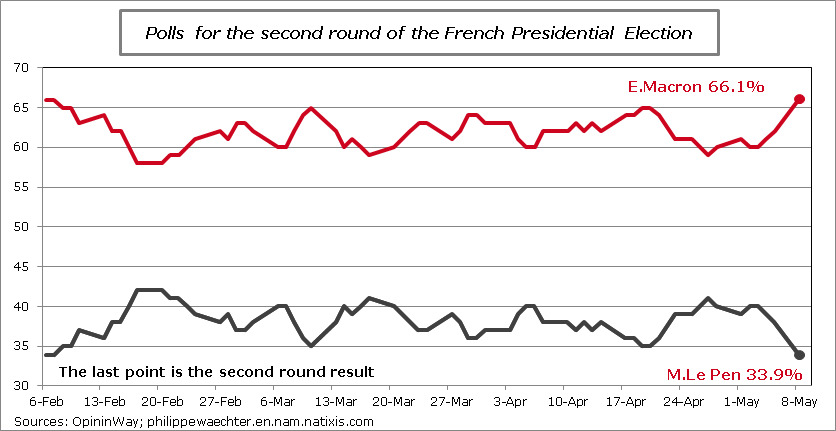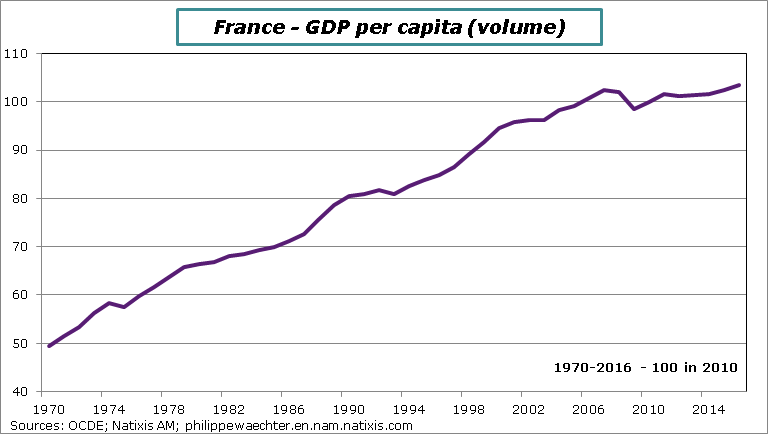The new French President, Emmanuel Macron, has won with a large margin. He had 66.1% of voters versus 33.9% for Marine Le Pen the other runner up.
The hierarchy of the numbers is consistent with polls even if the final numbers were above the top for one and below the weakest for the other. This is shown on the graph below.
The margin is wider than the 60/40 financial investors had in mind. They were optimistic with 60/40 as the French economy is doing well (see here). With a wider margin and probably with a majority for the new president at the National Assembly we can expect strong financial markets in coming weeks.
On the political side, the postponement of voters has worked well for Macron. In days before the vote, a lot of voters from Mélenchon, Fillon and Dupont-Aignan joined Macron as they didn’t want Le Pen as president after the debate (last Wednesday).
The watershed between Macron and Le Pen was Europe. (see here and here)
Macron wants to adapt the French economy to a globalized world with the help of Europe. He has in mind to strengthen European institutions. He also says that he wants to adapt the French competitiveness to the global environment. That’s why he wants a lot of reforms. On Le Pen’s side, the target was to exit from all European institutions. She has this populist view that by closing borders, jobs and growth can be saved.
French people have decided collectively to improve their competitiveness saying that there is no determinism and that they can change their fate by themselves in a global environment. That’s a collective intelligence.
Nevertheless Emmanuel Macron has a lot of challenges in front of him
Growth is not strong enough, as the graph below shows. The GDP per capita is showing a fracture in 2007 and this lack of growth is a strong source of populism as it creates uncertainty for everyone.
Macron has three targets for that
The first is to reinforce links with Germany and to strengthen European institutions. France needs Europe to be strong in the world economy. France cannot be strong alone. That’s a real difference with Le Pen
The second is to increase investment. He wants to create incentives to higher private investment through an impulse from public investment. The target is to increase the slope of potential growth. He has a public investment plan of EUR 50bn.
The third point is on the labor market. He said that higher growth is a necessary condition for higher jobs but he wants to reform the French labor market in order to increase its reactivity to the French growth momentum.
He wants to do two things:
The first is to say that companies have very different frameworks depending on their sector. He wants the scale of decision on the labor market to be at companies’ level (or at least at sectoral’ level). This was already targeted by the recent law of the labor market from Myriam El Khomri.
What is new is on the other side of the market. He wants to improve education for everyone. In France when you’re out of the labor market it’s very hard to find a job and to improve qualifications. Macron wants to reduce this constraint. this will go through education. The by-product of that is the capacity for the French labor force to adapt rapidly to a changing world. Growth will improve through higher human capital.
His target is flexi-security as it is done in Sweden or in Denmark. The company can easily adapt the level of its employment (on the upside and on the downside) but labor market institutions through education will dramatically reduce uncertainty for the labor force. If someone is on the dole he will improve his education to find rapidly a new job. If this works well, uncertainty is lower and the labor market becomes more flexible without risks.
In the short run, the complicated story is that Macron wants to govern through ordinances on the labor market. That will potentially be a source of weakness as Trade-Unions have said no. That will be his first measures but also the first possibility of defiance from Trade-Unions. It will be instructive on the way Macron wants to govern and to discuss with social partners.
The three elements developed above should improve the French growth momentum and employment. It would be a good answer to populism. Macron’s challenges are high because for the moment no one has really found the solution for growth and employment and that’s the reason of Marine Le Pen at almost 35%.
Macron will have the advantage that the French economic prospects are strong (see here). Our European partners are doing well and the French cycle is virtuous and autonomous (see here).
Macron will become President on May the 14th and he will choose his Prime Minister on May the 15th. The government will follow.
General elections will be on June the 11th and 18th. First polls show that Macron may have the majority at the national Assembly. This would be consistent with the fact that French people are legitimist.

Philippe Waechter's blog My french blog



